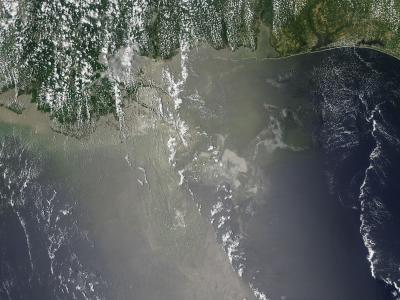
Image courtesy NASA MODIS Rapid Response Team/Holli Riebeek
A compilation of spill science that might otherwise be hard to see camouflaged against the clutter of headlines.
- Researchers have discovered a new strain of bacteria that could be of considerable value in the long-term cleanup of the massive Gulf Coast oil by degrading polycyclic aromatic hydrocarbons (PAHs)—the compounds in oil that are toxic, carcinogenic, and mutagenic.
- A new field technique for mapping and testing oil-contaminated soils skips the time- and money-consuming lab tests to accurately predict the total amount of petroleum contaminants in moist unprepared soil samples.
- Violent outflows of methane from the sea floor might have spiked the planet’s temperature ~55 million years ago, and scientists en route to the Gulf of Mexico think the spill (also leaking methane) affords a unique opportunity to study an analog in real time.
- Four generations of researchers have been studying a 1969 diesel spill in Buzzard’s Bay, Massachusetts. In this video Christopher Reddy of WHOI describes what they’re still finding out there and how it might or might nor relate to the Deepwater Horizon disaster.
- How endangered are the Gulf’s brown pelicans? Roughly 60 percent of the subspecies Pelecanus occidentalis carolinensis that breed along the Gulf coast and nest on the barrier islands off Louisiana have already been exposed to oil.
- A new analysis finds that as early as 2015 oil production capacity is going to begin to be challenged in terms of meeting rising demand, particularly from continuing growth of the economies of China and India, and that conventional oil reserves are actually 30 percent lower than generally accepted.
- The Gulf of Mexico Loop Current changes in intensity through the year. Early in the year it’s fairly slow, then picks up speed during the summer, generating more eddies along the way, some likely to spin off and carry oil back to the untouched estuaries and beaches of western Louisiana and Texas.











